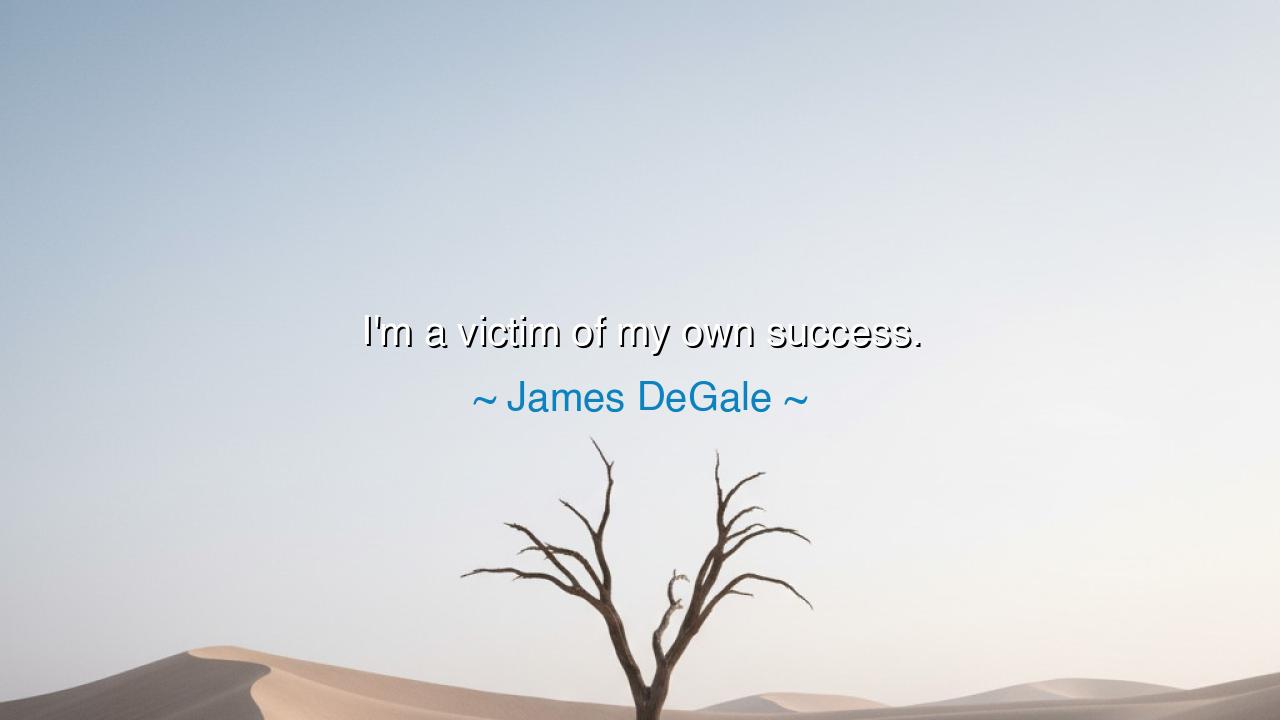
I'm a victim of my own success.






The words of James DeGale — “I’m a victim of my own success.” — strike like a warrior’s sigh after battle. They are not spoken in pride, nor in weakness, but in the weary honesty of one who has borne the weight of victory. For when a man achieves greatness, he does not walk into a meadow of rest, but into a field where new chains are forged: expectations, envy, scrutiny, and the relentless demand to surpass himself again and again. Thus, success, which to the unknowing seems a crown of gold, may to the bearer feel like a burden of iron.
The ancients understood this paradox well. Consider the tale of Hercules, who after his labors was hailed as the mightiest of mortals. Yet his strength, the very thing that won him glory, also bound him to unending trials. He could not live as a simple man, nor retreat into peace; his success demanded ever greater feats. So too with DeGale, whose victories in the boxing ring lifted him to fame, yet chained him to expectations that few shoulders could bear. His triumphs, rather than granting him freedom, summoned new battles of body, mind, and spirit.
We see this same truth in the story of Julius Caesar. Having conquered Gaul, he returned to Rome not to retire in honor, but to face civil war, betrayal, and a death at the hands of those he once called allies. His victories made him a giant, but also painted a target upon his back. He became, in his own way, a victim of his own success, for the higher one rises, the sharper the winds of fate become. The summit is glorious, but it is also perilous, for there is little ground upon which to rest.
DeGale’s lament also carries a warning to the ambitious: to seek greatness is noble, but to achieve it is to invite new trials. The world does not let its champions rest; it demands more, presses harder, and rarely forgives failure. What once was celebrated as triumph is soon expected as routine. And when the hero falters, the crowd that once cheered may turn to jeering. Such is the double-edged sword of glory.
But let us not despair. To be a victim of success is also to be chosen by destiny. For only those who rise high enough can know this burden. The weight of expectation is heavy, but it also proves that one has built something worth expecting. To suffer under the crown is still greater than to have never worn it. The lesson is not to flee from success, but to prepare the soul for its trials, to meet its pressures with wisdom and humility.
Therefore, O listener, take heed: when you strive and when you triumph, do not let the victory blind you. Expect that challenges will follow, that new responsibilities will be laid upon your shoulders. Guard your heart against arrogance, but also against despair. Do not measure yourself only by the demands of others, but by the integrity of your own spirit. For the world may consume its champions, but the true warrior is he who finds meaning even in the burden.
And in your own life, when the fruits of achievement turn heavy in your hands, remember this teaching: success is both crown and cross. Wear it with dignity, but do not let it enslave you. Seek balance, seek renewal, seek the quiet strength that lies not in endless triumph, but in the courage to endure the cost of triumph. For though you may one day cry, as DeGale did, “I am a victim of my own success,” let it also be said of you that you bore it well, and that your legacy was not undone by the weight of your crown.






AAdministratorAdministrator
Welcome, honored guests. Please leave a comment, we will respond soon